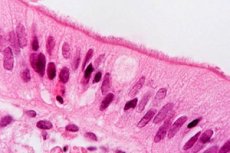New publications
Irritable bowel syndrome is caused by a spirochete.
Last reviewed: 02.07.2025

All iLive content is medically reviewed or fact checked to ensure as much factual accuracy as possible.
We have strict sourcing guidelines and only link to reputable media sites, academic research institutions and, whenever possible, medically peer reviewed studies. Note that the numbers in parentheses ([1], [2], etc.) are clickable links to these studies.
If you feel that any of our content is inaccurate, out-of-date, or otherwise questionable, please select it and press Ctrl + Enter.

For a long time, it was believed that irritable bowel syndrome with diarrhea is an exclusively functional disorder caused by neurological, microbiological, hormonal, and hereditary factors. However, scientists have recently discovered that the main culprit of the disease is a bacterial microorganism - the spirochete Brachyspira. This information was voiced by scientific experts representing the Swedish University of Gothenburg.
In almost all countries of the world, 5-10% of people periodically suffer from irritable bowel syndrome with diarrhea. The pathology is manifested by frequent urges to defecate (especially after or during meals), pain in the area of the intestinal projection, loose stools several times a day (sometimes alternating diarrhea with constipation), tenesmus, etc. If the disease has a mild course, then life activity suffers little, but intense symptoms have an extremely negative effect on the quality and way of life, effectively “tying” a person to the toilet. Until recently, the problem regarding the actual source of the syndrome had no solution. But today, scientists seem to have found answers to questions about the origin and mechanisms of the disease.
It is a known fact that irritable bowel syndrome manifests itself after poisoning, intestinal infectious lesions, which indicates the involvement of bacterial imbalance in the development of the disease. But studies on dysbacteriosis usually did not show a pathological picture. Specialists took a different approach, examining a biopsy taken from the sigmoid colon: the analysis was carried out using the immunofluorescence method, polymerase chain reaction, and also using an electron microscope. In total, more than sixty patients with this syndrome and more than thirty healthy people aged 18-65 years were examined.
According to the results of the experiment, the mass presence of the Brachyspira spirochete on the intestinal mucosa was found in 30% of sick patients, and in none of the healthy participants. In approximately 20% of cases, the spirochete was attached to the apical membrane of colonocytes: this caused the activation of mast cells and the development of an inflammatory reaction.
The specialists prescribed a course of treatment with Metronidazole for the patients. The therapy provoked the transition of the pathogen into the secretory granules of goblet cells: the scientists note that they had not previously considered such a method of bacterial survival.
Experts say that if the study's findings are confirmed, the treatment regimen for irritable bowel syndrome could change dramatically. Since the spirochete triggers histamine-like intestinal inflammation, potential treatments could include antihistamines, elimination diets, and antibiotics and probiotics.
The information is published on the pages of the medical publication of gastroenterologists and hepatologists Gutmedical publication of gastroenterologists and hepatologists Gut
